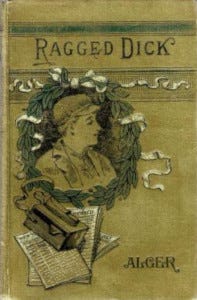For Your Careful Consideration: Horatio Alger
by the Reshelving Alexandria Team (as of 2020)
One of the many benefits of living in the Internet age is access to ever-increasing storehouses of information. Not only do we have the wisdom curated by lovers of living books who have blazed the trail ahead of us, but we also have access to a wealth of sources that were unavailable widely just decades before.
Often our research at Reshelving Alexandria into the lives of authors can give us a greater appreciation for, and understanding of, their work. Sometimes, however, there may be something in the life of an author or in their stories that prevents us from recommending an author or book. Great care must be taken, of course, to weigh all available evidence, examine and authenticate primary and secondary sources, consider context, and discern whether the author or story is in violation of universals, or simply failing to live up to our current expectations of conduct or beliefs.
In researching authors to recommend, we came across some very troubling information regarding Horatio Alger, one of the most popular and prolific children's writers of the later half of the nineteenth century, having over one hundred titles to his name. His first and bestselling book, Ragged Dick, remained in continuous publication for over forty years. He is estimated to have sold twenty million copies of his books. His formulaic stories feature a 'strive and succeed' theme: a young ragamuffin living on the streets, in poverty, experimenting with various vices and surrounded by dubious companions; the boy hero inevitably, through his own hard work, a stroke of good luck, and the mentorship and benevolence of a kindly older gentleman, learns to navigate the world of male friendships and overcome the obstacles he is facing to arrive at a life of respectability and success. Alger used part of his large fortune from these sales to support charitable causes for the street boys with whom he surrounded himself—often runaways and foundlings.
While a complete biography is easily obtainable elsewhere, what is relevant to our present consideration is that fact that just prior to the writing of his first book in 1866, while serving as a pastor of the First Unitarian Church in Brewster, Massachusetts, Alger was charged, by a church committee formed to investigate the matter, with "the abominable and revolting crime of unnatural familiarity with boys". Rather than disputing the charges, Alger admitted his 'imprudence' and fled to New York, sending Unitarian officials in Boston a letter of remorse. His father reached out as well, assuring church leadership that his son would not seek a ministerial post in the future.
The matter was not pursued further by the Unitarian church. Alger did not, however, distance himself from his victimized demographic. Instead, he pursued a career that would continue to not only potentially give him access to further victims, but would also ingratiate himself to them.
Given the gravity of the crimes, as well as the fact that these were not spurious accusations or idle gossip but were met with Alger's own admission of 'imprudence,' and the trail of primary sources substantiating the events in question, along with his choice to associate with, write for, and earn a living off of the very children he preyed upon, we have chosen not to include him or his stories in our catalog of recommended authors and books.
Sources
Horatio Alger, Jr. by Gary Scharnhorst: pages 29-30
Further Reading
Chesley Howard Looney, Doctor of Philosophy, wrote a dissertation in 2005 on author Stephen W. Meader that we recommend reading as there are numerous contrasts to Horatio Alger's writings: Stephen W. Meader: His Contributions to American Children's Literature.

